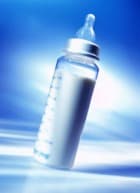 Along with their little bundle of joy and a stack of papers and pamphlets, some new parents are still being sent home with samples of baby formula, even though formula giveaways are criticized by the World Health Organization, CDC, and American Academy of Pediatrics. Click here to see how to prepare formula
Along with their little bundle of joy and a stack of papers and pamphlets, some new parents are still being sent home with samples of baby formula, even though formula giveaways are criticized by the World Health Organization, CDC, and American Academy of Pediatrics. Click here to see how to prepare formula
A new study found that while this practice is still prominent, it has decreased over the past few years. And recent headlines, such as a new report from the Breast Cancer Fund, about the toxic chemical bisphenol A (BPA) being found in canned baby formulas and foods has only fueled the ongoing debate. So, aside from the BPA issue, what’s the argument against baby formula samples from hospitals?
Advocates who discourage formula giveaways feel that the samples undermine advice to breast-feed exclusively for 6 months, a recommendation from the American Academy of Pediatrics based on several health benefits. Others assert that hospitals should not be marketing any particular brands to patients, especially more expensive name brands that parents may feel pressured to buy.
In a recent Pediatrics follow-up study, researchers found that although the number of sample-free hospitals has increased, most US hospitals continue to distribute industry-sponsored formula sample packs. Of the 1,239 hospitals they re-surveyed, 28% were sample-free in 2010, up from 14% in 2007.
While breast-feeding may be the best nutritional option for infants, it may not be the best method for everyone, argue proponents of the samples, so they feel it’s important to provide patients with an alternative and educate them on how to use it.
Physician’s Weekly wants to know…
- Do you think providing a formula sample misguides new parents on the best nutrition for their children?
- Private practice physicians hand out free samples of name-brand medications; is this type of “marketing” any different?


